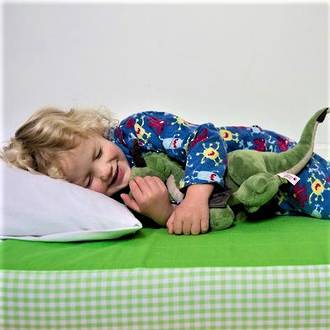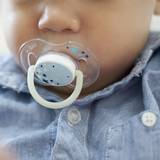Shop
02622
https://www.under5s.co.nz/shop/Hot+Topics+Articles/Health+%26+Wellbeing/Toddlers/Tips+on+starting+night+time+toilet+training.html
Tips on starting night time toilet training
|
Thinking of night time toilet training? Once your child is out of nappies during the day, the next step is to start toilet training at night. Every child is different, so is the length of time it will take for them to be fully night time toilet trained will differ too. Just remember, it’s not a competition!
|
You might also be interested in ...
10 Steps to ditching your toddler's dummy
Is it time to ditch your toddler's dummy? The longer you leave it to get rid of your toddler's dummy, the more attached they will become to it. Bite the bullet while they're young and the agony will be less in the long run (although it may not feel like it at the time!). Make a start and follow these 10 simple steps.
First visit to the dentist
So when should kids first visit the dentist? Sooner than you may think! Find out at what age you should take your kids to the dentist, choosing a dentist and things you can expect from their first visit.
join usJoin us on social media for all our latest news. |
sign upSign up and receive our latest newsletters. |
|







Every child is different, so is the length of time it will take for them to be fully night time toilet trained will differ too. Just remember, it’s not a competition!
The age your child becomes dry and how fast it happens is nothing to do with your child or your parenting skills. It can be down to the size of their bladder, how deeply they sleep, or for medical reasons.
Also, if you or your partner wet until you were older, then your child is also likely to take longer too. Yep – genetics plays a part as well!
Signs your child is ready for night time toilet training
Tips on starting night time toilet training
Here are some tips from our friends at Brolly Sheets to help get you started on your night time toilet training journey.
1. Prepare your child & their bed
Bottom line, there is going to be extra laundry and you will need to get up in the night.
So, is the time right for you and your child? Don’t start just before the new baby is due or a week or so before kindy or school starts.
Some kids think that when they stop using nappies at night they will automatically wake up dry in the morning. So set some realistic expectations up front.
Explain to them that there may be accidents, it may take some time before they're completely dry at night and this process is something that everyone goes through.
Make sure your child’s pyjamas are easy to pull up and down in the middle of the night and put a bed pad on their bed to protect the mattress from any accidents.
2. Set a bed time routine
A good routine at night will help when it comes to night time toilet training.
If your child is very tired, it will be harder for their brain to trigger the signal they need to wake up and wee.
Before bed, ensure your child goes to the toilet and does a ‘decent wee’. Some kids rush through this part.
It is a good idea to sit down whilst your child is on the toilet and explain how their bladder is like a plastic bag and that they need to empty ‘this bag’ before bed. Get them to take their time.
It is also a good idea to remind them if they wake in the night and feel the need to wee – to get up and go.
3. Limit drinks
If your child is drinking plenty during the day they should not need a lot of extra drinks in the evening.
The trick here is to make sure they are drinking plenty during the day. If you are unsure what they do at kindy or school, give them a big drink with breakfast and when they get home.
Plus you can make a game of how many drink bottles they can drink at kindy or school.
If they do want a big drink before bed, explain what you are both trying to achieve and that what goes in must come out.
Ensure they stay away from caffeinated drinks as caffeine is a diuretic which means you have to pee more often.
Now is the time to drop the bottle if your child still has one before bed too.
Limit drinks from dinner time. If your child is drinking plenty during the day, they should not need a lot in the evening.
4. Light the way
A night light is great if your child does wake and needs to go to the toilet, as they will be able to see where they are going.
As an adult, sometimes we take things for granted like walking around in a dark house at night. A night light makes the house not such a scary place in the dark.
A night light also means if you need to get up and change the bed, you don’t need to use the brighter ceiling light. Hopefully you can change the bed and your child’s pjs quickly and not even have to fully wake up.
5. Have realistic expectations
Unlike day time dryness, children have very little control over their bladder when they sleep.
A reward chart may help, but remember, wetting the bed is out of their control.
So, you can reward things like going to the toilet before they go to bed, changing their own pyjamas whilst you change the bed, limiting drinks etc. Rewards need to be in your child’s control.
If your child becomes anxious or frustrated, put training on hold for a while and come back to it at a later stage.
Source: This article was kindly written for us by Brolly Sheets - Your one stop shop for toilet training and waterproof bedding products.